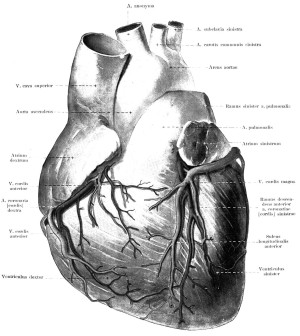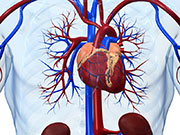- 10 Strategies to Overcome Insomnia
- Could Artificial Sweeteners Be Aging the Brain Faster?
- Techniques for Soothing Your Nervous System
- Does the Water in Your House Smell Funny? Here’s Why
- Can a Daily Dose of Apple Cider Vinegar Actually Aid Weight Loss?
- 6 Health Beverages That Can Actually Spike Your Blood Sugar
- Treatment Options for Social Anxiety Disorder
- Understanding the Connection Between Anxiety and Depression
- How Daily Prunes Can Influence Cholesterol and Inflammation
- When to Take B12 for Better Absorption and Energy
Blood Chemical Test May Predict Risk of Heart Disease Death


Higher-than-normal levels of a certain blood chemical may place some patients at significantly greater risk of dying from heart disease, new research indicates.
Scientists found that nearly one out of three people with diabetes and stable angina — a condition causing chest pain — who also had elevated levels of troponin in their blood died of a heart-related problem within five years.
Troponin, a protein found in heart muscle, is released into the bloodstream when heart damage occurs. Normally detected in patients suspected of having a heart attack, troponin at much lower levels is also identifiable in a high-sensitivity version of a test commonly used in Europe but not yet approved by the U.S. Food and Drug Administration.
“I think we anticipated that there would be a strong relationship between the troponin test and future death from heart attack, heart failure and stroke,” said study author Dr. Brendan Everett, director of the general cardiology inpatient service at Brigham and Women’s Hospital in Boston.
“But we’re surprised by the strength of the relationship,” added Everett. “The most compelling thing is that we have a marker that’s a really strong predictor of outcome and . . . gives us the opportunity to develop new therapies for these patients.”
The study is published Aug. 13 in the New England Journal of Medicine.
Heart disease is the top killer of Americans, causing about 735,000 heart attacks and 610,000 deaths each year, according to the U.S. Centers for Disease Control and Prevention.
Using the high-sensitivity troponin test, Everett and his team measured troponin levels in nearly 2,300 patients with both type 2 diabetes and so-called stable heart disease, or angina, which includes narrowed cardiac arteries but no acute heart injury. Type 2 diabetes is also a major risk factor for heart disease.
About 40 percent of participants had abnormal troponin levels, the study found. After five years, 27 percent of participants with elevated troponin had died of a heart attack, stroke or other cardiovascular causes, compared to 13 percent of those with normal troponin levels.
The researchers also found that the five-year death risk of patients with high troponin levels did not significantly decrease when these patients underwent treatments designed to open up narrowed heart arteries, such as coronary bypass surgery or stent placement.
“I was hopeful that the therapy tested . . . would offer an improvement in those outcomes,” Everett said, “but unfortunately that’s not what we saw.”
Dr. Matthew Roe, an associate professor of medicine at Duke University Medical Center in Durham, N.C., praised the study, saying it focused on “an important topic and the findings are highly relevant.”
Roe, author of an editorial accompanying the study, said the results confirm prior findings.
“It’s highly likely this test is a unique test discriminating patients who have a high risk of adverse cardiovascular outcomes,” said Roe, who wasn’t involved in the research.
But despite the test’s demonstrated usefulness in predicting higher risk of early death among those with angina and type 2 diabetes, Everett said he doesn’t think it should be routinely administered to these patients.
“I think it would be premature [to do that] because we don’t have a specific therapy to deal with an abnormal troponin level,” he said. “If we get the test back and can’t do anything about [high levels], it’s tough to recommend.”
Roe said more research should be done in short order, both to understand how to further utilize the high-sensitivity troponin test and determine effective treatments for patients with elevated troponin levels.
“There are many patients with cardiovascular disease in the U.S., and we’re always trying to refine how we can better evaluate and treat these patients,” he said. “I think this is a good step forward. This study was well-conducted and it’s time to start having these discussions.”
More information
The U.S. Centers for Disease Control and Prevention offers heart disease prevention tips.
Source: HealthDay
Copyright © 2026 HealthDay. All rights reserved.










